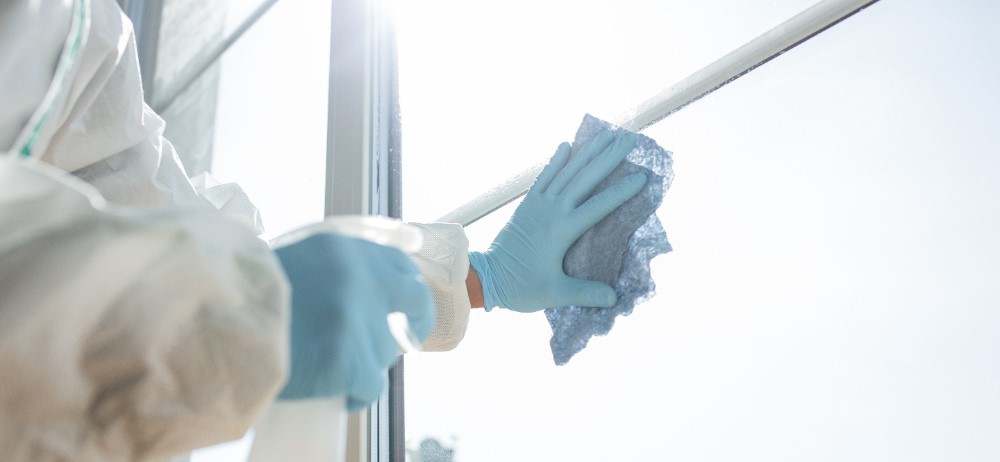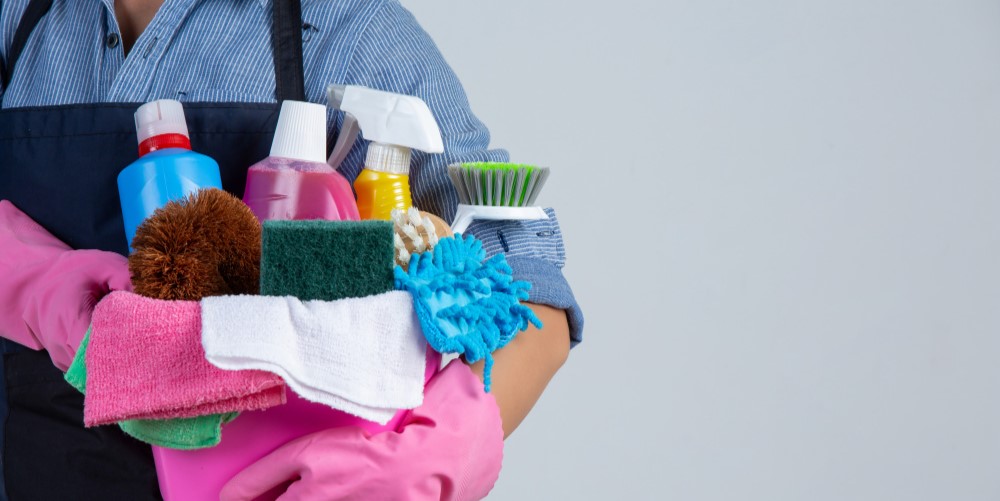Starting a cleaning business can be a rewarding and flexible career choice, with the potential for steady growth. Whether you’re seeking extra income or looking to build a full-time venture, the cleaning industry offers many opportunities. This guide will walk you through the essential steps to get your cleaning business off the ground – from forming your business idea to market research and operational strategies.
1. Forming your business idea
Lauren’s Story
We recently sat down with Lauren, a cleaning business owner who made the transition from marketing to cleaning. Despite her marketing background, Lauren found that many of her skills – such as organisation, communication, and time management – were directly applicable to running a cleaning business. For her, the key was taking her skills from one sector to another, as she learned along the way.
Lauren’s advice for aspiring entrepreneurs is simple: “Have a passion for getting things done. If you have a knack for organising and love being on the move, the cleaning industry could be a great fit.”
Starting from scratch
Starting a business, especially solo, can feel daunting. Lauren’s journey wasn’t without challenges. She started cleaning part-time while still holding a marketing job, learning how to balance both careers, and eventually grew her business. This “side hustle” allowed her to test the waters while maintaining financial security.
2. Deciding between self-owned or franchise
When you start a cleaning business, one of the first choices you’ll make is whether to go solo or buy into a franchise. Both options come with their pros and cons.
Self-Owned Business
Owning your own cleaning business gives you complete control. You’re in charge of all aspects – from branding to operations. If you’re someone who thrives on autonomy and wants to create something unique, this might be the best option for you.
Franchise Business
On the other hand, franchising provides a pre-built business model. With a franchise, you’ll pay a one-time fee (typically around £12,000) and receive all the necessary branding, marketing materials, and business support. This allows you to start quickly with a proven system in place, although you won’t have the same freedom to customise your business as with a self-owned model. There are plenty of them out there – such as Molly Maid.
3. Defining your business specialisation
The cleaning industry offers different niches, and it’s often best to specialise at first. Here are three major pathways you can take:
Domestic cleaning
This includes regular cleaning of homes and personal spaces. While the job may seem straightforward, trust plays a huge role, as you’re entering clients’ private homes. Word-of-mouth referrals are definitely a good way to get started.
Specialised cleaning
This includes industrial and more technical cleaning, such as cleaning machinery in factories or high-rise window cleaning. These services tend to require more training and specialised equipment, but they can be far more lucrative than domestic cleaning due to the skill involved.
Commercial cleaning
Commercial cleaning involves cleaning office buildings and business spaces. It typically requires a team of workers and often takes place outside regular business hours. This area can be profitable as businesses often need regular cleaning services, creating a steady demand.
4. Market research and planning
Before you actually start any business, it’s essential that you perform thorough market research. We have listed a few things below that you need to consider:
Target market
Your ideal client will depend on the type of cleaning service you offer. Domestic cleaning targets homeowners, while commercial and industrial cleaning focuses on businesses. Understand who they are, where they are located, and what they need.
Competitor research
Carry out competitor analysis by looking at other cleaning businesses in your area. Find out what services they offer, how much they charge, and how they market themselves. This will help you identify gaps in the market and potential opportunities.
Pricing strategy
Research the average prices and rates rates for cleaning services in your area. Your pricing should reflect your target market and the cost of supplies, transportation, and your time.
PESTEL analysis
Consider external factors that could impact your business, including political, economic, social, technological, environmental, and legal factors. This analysis will help you understand the broader landscape and any potential challenges you may face.
By following these steps, you’ll be well on your way to building a solid foundation for your cleaning business.
5. Branding: Get your marketing right
It’s crucial to allocate part of your initial budget to marketing when you get started. Building a client base from scratch is challenging, but effective marketing can make a significant difference. Your marketing strategy should focus on two key aspects: branding and advertising.
Branding
Before you register your business name or design your logo, take some time to think about your branding. This includes your business name, logo, colour scheme, and the message you want to convey. Strong branding is essential because it will define how customers see your business and remember it.
If branding or design isn’t your strength, consider hiring a professional. From freelance graphic designers to branding agencies, there are affordable options available. But before you do that, reflect on the type of customers you want to target. For instance, eco-friendly products might appeal to environmentally-conscious clients, while luxury brands can attract high-end consumers. Every business decision, like using green cleaning products or supporting local charities, plays a role in your branding.
Advertising
Advertising is critical to attract new customers. Several advertising methods have proven effective in the cleaning industry, including:
- Newspaper/magazine advertising: Local publications are still a great way to advertise cleaning services. They are inexpensive and yield good results as they are where potential clients expect to find businesses like yours. Ensure your ad is eye-catching and concise.
- Flyers: Flyers are cost-effective and easy to distribute. You can distribute them with local newspapers or hand them out personally in your local area.
- Magnetic car sidings: Magnetic signs on your vehicle can attract attention wherever you go. Whether driving or parked, your brand will be visible to others.
- Business cards: Although smaller than flyers, business cards are often retained by potential clients. Place them in local businesses to increase your reach.
Additionally, don’t hesitate to try new tactics that are less common in the cleaning industry:
- Website: A simple website can make you stand out online. Even a one-page site detailing your services will help you appear more professional. Offering online booking can also make it easier for clients to book your services.
- Networking: Networking groups are a powerful way to gain new clients. Many cleaning businesses don’t network, so this can give you a competitive advantage.
- Social media: Social media platforms, like LinkedIn or Facebook, can help you reach commercial clients. Join relevant groups and start conversations to build connections.
Remember, effective marketing is about quality over quantity. Experiment with different methods, track the results, and adjust your strategy to maximise your return on investment.
6. Operations: Costs and funding for your cleaning business
Cleaning businesses are known for their low start-up costs. Most of your initial investment will go toward equipment, chemicals, and insurance. While some cleaners use personal vehicles to save money, others may choose to purchase a van. Here’s a breakdown of common costs for a cleaning business:
- Basic supplies: Brushes, cloths, dusters, etc. Costs range from £50–£100.
- Larger equipment: Vacuum cleaners (£100+), sweeping machines (£200–£2,000), or an equipment trolley (£250–£400).
- Chemicals: Basic cleaning chemicals will cost around £150. Eco-friendly options may cost more.
Business costs
- Public Liability Insurance: £38 annually.
- Professional Indemnity Insurance: Variable.
In total, you could launch a basic cleaning business with an investment of around £150. However, as your business grows, you’ll need to invest in advertising, hired help, and more.
Funding your business
If you don’t have all the capital you need, here are several ways to fund your cleaning business:
- Start-up loans: Available from government schemes or commercial banks.
- Government grants: Some councils offer grants to support small businesses.
- Asset finance: If you need equipment, consider financing instead of paying upfront.
- Angel investors: Find investors who will back your business.
- Peer-to-peer lending: Borrow from individuals or businesses.
Budgeting
Once you’ve covered your initial costs, plan your monthly cash flow. Many small business owners forget to account for costs like National Insurance, personal tax, vehicle maintenance, and insurance premiums. Here are some budgeting tips:
- Remove unnecessary expenses: Cut costs by switching to cheaper products or only dry-cleaning unitorms once a fortnight.
- Review regularly: Analyse your budget every 6–12 months to adjust for any changes.
- Save: Set aside a portion of profits for a rainy day or tax bills.
- Time is money: Set time limits for tasks to maximise productivity.
Financial planning tools
Using financial forecasting software like Brixx can help you manage your budgeting and forecasting. Brixx allows you to input your costs, forecast revenue, and calculate the impact of each business decision. This will help you plan ahead and make more informed financial choices.

7. Regulations and legal considerations
- Register your business: Whether you’re a sole trader or setting up a limited company, registering your business with HMRC is a legal requirement. You must also register for self-assessment tax.
- Insurance: Adequate insurance is essential for your cleaning business, covering public liability and professional indemnity.
- COSHH regulations: Follow the Control of Substances Hazardous to Health (COSHH) regulations when using cleaning chemicals. Failing to comply can put your business and clients at risk.
- National minimum wage: If you employ staff, make sure you comply with the National Minimum Wage laws.
- Specialised training: Although formal qualifications aren’t required, training can give your business a competitive edge. Consider courses like COSHH training, infection control, or health and safety in the workplace. We have listed a series of areas to train in below:
8. Growth: Scaling your cleaning business
Once your cleaning business is established, you may want to scale it. Here are a few strategies to grow your business:
- Plan for growth: Set annual goals and regularly assess your business to ensure you’re on track.
- Choose your growth path: Whether you want to expand your team, offer new services, or reach a wider market, decide what growth looks like for you.
- Stick to your core service: While expanding, keep your unique selling proposition (USP) in mind to retain your existing clients while attracting new ones.
- Find a mentor: Seek guidance from experienced business owners or mentors to avoid common pitfalls.
Conclusion
Whether you’re a new cleaning business or aiming for rapid growth, Brixx can help you visualise your business model, forecast revenue, and make strategic decisions that lead to long-term success. It is the perfect forecasting tool for startups.
By using financial forecasting, business modeling, and scenario analysis, you can plan for growth and ensure that your business remains profitable. Planning for the future with Brixx gives you a much higher chance of success in today’s competitive market.
Get started with Brixx for free today to take control of your cleaning business’s financial future and scale confidently!















